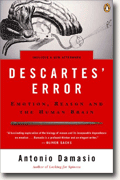Descartes' Error
Antonio Damasio
book reviews:
· general fiction
· chick lit/romance
· sci-fi/fantasy
· graphic novels
· nonfiction
· audio books
· author interviews
· children's books @
curledupkids.com
· DVD reviews @
curledupdvd.com
newsletter
win books
buy online
links
home
for authors
& publishers
for reviewers

 |
Descartes' Error: Emotion, Reason, & the Human Brain Antonio Damasio Penguin Paperback 336 pages September 2005 |
|
Neurologist Antonio Damasio has been interested in the relationship between cognition and emotion for a long time. He’s written two previous books on the subject, The Feeling of What Happens and Looking for Spinoza. In Descartes’ Error, Damasio elaborates on the theme that has occupied him throughout his scientific career and in his writing: the idea that “mind”—and all that implies, including sense of self, rationality, and sense of place—is “body.”
In the past twenty years or so (though clearly building on work much older; Plato, for all his dominance in the history of ideas, has had sharp critics over the past 2,500 years) scientists having been pushing philosophers to reconsider the old mind-body dualism. Damasio is one of the scientists piling on the evidence that heals that ancient split. (Damasio doesn’t make a big deal out of it here, but many people have observed that the mind-body split is peculiar to Western philosophy and is just one of the many ways that philosophy has failed us, leaving us at the mercy of religion.) Damasio’s great contribution is to refocus cognitive science on emotion. As philosopher Mark Johnson pointed out a number of years ago, mind is “more than cool reason.” Emotion—and feeling in general—have tremendous survival value. We feel pain for a reason: if it hurts, do something about it! Likewise all our other emotions and sensations are clearly of evolutionary value. What Damasio argues is that emotion is also a basic component of cognition. Just as the sensation of heat causes us to change position (either toward or away from the source, depending on its intensity and the otherwise ambient temperature), so too emotion is a critical factor in making decisions. The brain, Damasio points out, stores emotional memories; why use up valuable brain energy (the brain has a very high energy cost compared to the rest of the body; that’s why thinking makes you hungry—you’re burning calories while burning the midnight oil) unless emotional memories have a reward in terms of survival? Damasio discusses cases of people with brain injuries (such as the famous Phineas Gage, the railroad worker who had a spike driven through his head and subsequently became a very different person) to support his arguments. The beauty of Damasio’s engagement with this material is that it undermines the prevailing metaphor of mind-as-computer by putting “moral values” (to use the fad phrase) back into the picture. We are who we are based, at least in part, on what we feel is “right.” And what feels right has a biological basis. Although Damasio’s theory of mind has extremely complex ramifications it is, at its core, simple, elegant and intuitively appealing. And in the long term, it is highly testable, which means it lends itself to verification through the scientific method. Best of all for those of us who are non-specialists, Damasio is a clean, clear and focused writer. His style is similar to that of the much-loved Oliver Sacks: Damasio judiciously deploys analogies and particulars to make his arguments clear. As Sacks says, “Damasio is a profound thinker and an elegant writer.” Originally published on Curled Up With A Good Book at www.curledup.com. © Brian Charles Clark, 2005 |
| Other books by Antonio Damasio: |
|
|
|
 Click here to learn more about this month's sponsor! |
|
| fiction · sf/f · comic books · nonfiction · audio newsletter · free book contest · buy books online review index · links · · authors & publishers reviewers |
|
| site by ELBO Computing Resources, Inc. | |
 René Descartes’ mistake, says Damasio, was to separate mind from body. Descartes insisted that mind—or “soul” as the 17th-century philosopher had it—motivated (literally “caused to move”) and ruled the machine of the body. This idea wasn’t actually totally new with Descartes, as Plato, in The Republic and elsewhere, said something along those lines back in the 5th century B.C. with his theory of forms. But Descartes put his theory into (relatively) modern language and it’s his “Cogito, ergo sum” (I think, therefore I am) that has governed philosophy of mind ever since—at least until recently.
René Descartes’ mistake, says Damasio, was to separate mind from body. Descartes insisted that mind—or “soul” as the 17th-century philosopher had it—motivated (literally “caused to move”) and ruled the machine of the body. This idea wasn’t actually totally new with Descartes, as Plato, in The Republic and elsewhere, said something along those lines back in the 5th century B.C. with his theory of forms. But Descartes put his theory into (relatively) modern language and it’s his “Cogito, ergo sum” (I think, therefore I am) that has governed philosophy of mind ever since—at least until recently.